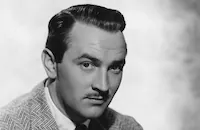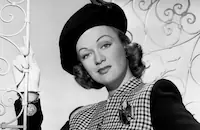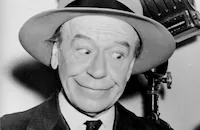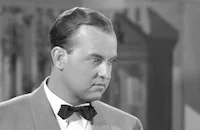Having Wonderful Time

Brief Synopsis
Cast & Crew
Alfred Santell
Ginger Rogers
Douglas Fairbanks
Peggy Conklin
Lucille Ball
Lee Bowman
Film Details
Technical Specs

Synopsis
Teddy Shaw works as a typist for a large, indifferent firm, but imagines herself as a sophisticated, well-read woman of the world. Single and still living at home, Teddy welcomes the chance to vacation at the mountain resort, Camp Kare-Free. Upon arriving at the camp, she meets Chick Kirkland, a handsome camp employee who accidentally drops her luggage and incurs her defensive wrath. After Itchy, the social director, gives a demonstration in the art of dunking doughnuts, Teddy finds herself suddenly defending Chick's honesty to his mess hall employer. Although Chick loses his waiter job, he pursues Teddy and eventually breaks through her snobbish exterior. Deeply in love, Chick talks of marriage but tells Teddy he will marry her only when he has a good job. After Chick suggests that, in the meantime, they indulge in pre-marital sex, Teddy runs from him and into the arms of Maxwell "Buzzy" Pangwell, a notorious womanizer. Buzzy takes a rain-soaked Teddy to his cabin and tries to seduce her, but she proposes that they play backgammon instead. Intent on making Chick jealous, Teddy spends the night at Buzzy's cabin playing backgammon by herself. The next morning, Emil Beatty, Teddy's faithful but dull admirer, arrives to drive her home. Sure of her faithfulness, Chick knocks out both Emil and Buzzy, chases after Teddy, and proposes.

Director
Alfred Santell
Cast

Ginger Rogers

Douglas Fairbanks

Peggy Conklin

Lucille Ball

Lee Bowman

Eve Arden
Dorothea Kent

Richard (red) Skelton

Donald Meek

Jack Carson
Clarence H. Wilson
Allan Lane

Grady Sutton
Shimen Ruskin

Dorothy Tree
Leona Roberts
Harlan Briggs
Inez Courtney

Juanita Quigley

Etienne Girardot
Margaret Seddon
Kirk Windsor
Crew
James Anderson
Pandro S. Berman
Perry Ferguson
Robert De Grasse
William Hamilton
Arthur Kober
Elizabeth Mcgaffey
Ernest Pagano
Van Nest Polglase
Renié
Morrie Ryskind
Darrell Silvera
Sam H. Stept
Edward Stevenson
Charles Tobias
John E. Tribby
Vernon Walker
Roy Webb

Photo Collections
Film Details
Technical Specs

Articles
Having Wonderful Time
Having Wonderful Time was based on the 1937 play of the same name by Arthur Kober, who also wrote the film's screenplay. The play, which had been a hit on Broadway, centered around Eastern Jewish characters who vacationed in the Borscht Belt, and its humor was dependent on a familiarity with the region.
When RKO decided to turn the play into a film, the Hays Office-the department responsible for regulating the content of all Hollywood motion pictures--felt that the material was too specific to a limited demographic and ordered RKO to make some changes. "Well, the Will Hays organization - and that, as you know, is the censor with a capital C - first went on record as saying that the play could not be done as a picture," said writer Arthur Kober in an interview with the New York Times. "It was too much identified with the Bronx and the Jewish people might create misunderstanding, racial antagonism and all that. Thereupon, RKO very carefully explained that this angle would be entirely eliminated - that the picture would simply be about young people of the lower-middle class...So when I was called in to make the adaptation, the first thing I had to do was turn my Jewish characters into Gentiles. Teddy Stern, the little heroine, whom Ginger Rogers played, became Teddy Shaw; Chick Kessler, her sweetheart, played by Douglas Fairbanks, Jr., was given the handle of Chick Kirkland; Fay Fromkin, Teddy's friend, became Fay Coleman; 'Pinkie' Aaronson and Sam Rappaport got completely new names - they became 'Buzzy' Armbruster and Emil Beatty; and even poor 'Itchy' Flexner had to change his proud family name to Faulkner. Only the name of the camp...was allowed to remain. And, of course, by some curious contradiction of Hollywood's usual practice, the title of the play went unchanged."
For Ginger Rogers, making Having Wonderful Time was an opportunity to break out of the singing and dancing roles that she had become most associated with and prove that she was a real actress. The film reunited her with several of her co-stars from Stage Door (1937) including Lucille Ball, Eve Arden, Jack Carson and Ann Miller, though Miller's part in Having Wonderful Time wound up on the cutting room floor. According to Rogers, making the film was a positive experience all around, especially getting out of town for some location work at rustic Big Bear Lake about 100 miles outside of Los Angeles. "We spent two wonderful weeks in this beautiful mountain location," she said in her 1991 autobiography Ginger: My Story, "far from the noise of the big city."
Rogers also enjoyed working with handsome leading man Douglas Fairbanks, Jr. "Doug Fairbanks was a very cooperative actor and our working relationship was fine," she said. "However, in later years, his attitude toward me changed. For some reason, he persisted in referring to me as a 'chorus girl'...had this been true, I wouldn't have minded the label. But the range of my films and the breadth of my experience represented so much more that I was greatly disappointed by his view."
Douglas Fairbanks, Jr. gives his perspective in his 1988 memoir The Salad Days. "Ginger and I got along happily and well. In fact, she got along well with everyone...However, I was always on my best behavior with her because she invariably reminded me of an innocent high-spirited college kid, enthusiastic about ice cream sodas, with a vocabulary dependent on 'Gosh' and 'Gee-whiz.'"
Having Wonderful Time marked comedian Red Skelton's first appearance in a feature film as Itchy, Camp Kare-Free's zany social director. Skelton was an up and coming comedian at the time who had been performing on stage since he was a child. Skelton kept the cast and crew in stitches with his hilarious hijinks, but much of his material was unfortunately cut out of the final film. As Douglas Fairbanks, Jr. remembers in his memoir, "...the big bosses at the studio were unable to appreciate Skelton's broad, slapstick style and cut his part down to the barest minimum needed to hold the slender plot together." Still, enough of Skelton's comedy remains in the film to induce plenty of laughs and showcase his unique comedic skills that helped propel him to major stardom later on.
Critics praised Having Wonderful Time, though many of them made note of the significant changes the film made from the play. "Having Wonderful Time may well astound cineaddicts who saw the comedy by the same name on the Manhattan stage a year ago," said Time magazine. "To playgoers, the particular merits of Arthur Kober's study of a group of unmoneyed young New Yorkers vacationing in the Berkshires were that all of the visitors at Camp Kare-Free were unmistakably denizens of The Bronx and that the author had caught, with sympathy but cruel precision, all the semi-miraculous gradations of Bronx Jewish dialect. As presented on the screen, nothing but the name of the camp, Douglas Fairbanks, Jr.'s aquiline profile, and a few traits recognizable only to the student of the New York melting pot, identify the characters of Having Wonderful Time...Consequently, like an enlarged photograph which brings out virtues unsuspected in its smaller original, the cinema version of Having Wonderful Time is a kind of streamlined folk comedy, hilarious not because its characters are Jewish but because they are human."
Variety said, "Much of the charm, romantic tenderness and social problem features of Arthur Kober's stage play...are missing in the screen version. In their place, the author, who also did the screenscript, has substituted some lively horseplay and occasional slapstick and has accentuated the comedy angles...Public will accept it as a good time, and laugh heartily at its obvious humor." Frank S. Nugent of the New York Times said, "There was nothing genteel about Arthur Kober's Having Wonderful Time and - bless its folksy heart - there was nothing gentile either. But RKO-Radio's film version...is neither. It still is an amusing show, of course, as any reasonably faithful copy of the play must have been, and it comes in the nick of vacation time when a million Teddy Shaws are abroad in the land, desperately eager to exchange fifty weeks of office routine for two weeks at a summer resort."
Director: Alfred Santell
Screenplay: Arthur Kober (screenplay and play); Morrie Ryskind (uncredited, contributor to dialogue and special sequence); Ernest Pagano (uncredited, contributor to dialogue and screenplay construction)
Cinematography: Robert DeGrasse
Art Direction: Van Nest Polglase
Music: Roy Webb (uncredited)
Film Editing: William Hamilton
Cast: Ginger Rogers (Thelma 'Teddy' Shaw), Douglas Fairbanks, Jr. (Chick Kirkland), Peggy Conklin (Fay Coleman), Lucille Ball (Miriam 'Screwball'), Lee Bowman (Buzzy Armbruster), Eve Arden (Henrietta), Dorothea Kent (Maxine), Richard 'Red' Skelton (Itchy Faulkner, Camp Social Director), Donald Meek (P.U. Rogers, Camp Owner), Jack Carson (Emil Beatty), Clarence H. Wilson (Mr. G), Allan Lane (Maxwell 'Mac' Pangwell), Grady Sutton (Gus), Shimen Ruskin (Shrimpo), Dorothy Tree (Frances), Leona Roberts (Mrs. Shaw), Harlan Briggs (Mr. Shaw), Inez Courtney (Emma, Teddy's Sister), Juanita Quigley (Mabel, Emma's Daughter).
BW-70m. Closed Captioning.
by Andrea Passafiume

Having Wonderful Time
Quotes
Trivia
Ann Miller (I) had a speaking part that was cut.
The play originally opened in New York City 20 February 1937 and had 372 performances.
Notes
According to reviews, Arthur Kober changed the setting and the ethnicity of his characters when he adapted his stage play for the screen. In the play, the characters were Jewish and the resort was in the Catskill Mountains. According to a Hollywood Reporter news item, scenes for the film were shot in the San Bernardino Mountains in Southern California. Having Wonderful Time marked the feature film debut of actor-comedian Red Skelton. Although Ann Miller is credited in reviews in the role of "Vivian," that part was cut from the picture. Motion Picture Herald's "In the Cutting Room" adds to the cast Dean Jagger and Dorothy Moore, while Hollywood Reporter production charts add Margaret McWade. Their appearance in the final film has not been confirmed. Modern sources list Dean Jagger's character name as "Charlie." Modern sources add to the cast: Betty Jane Rhodes (Singer), George Meeker and Ronnie Rondell (Subway mashers), Elise Cavanna (Office supervisor), Mary Bovard, Frances Gifford, Peggy Montgomery, Baby Marie Osborne, Mary Jane Irving, Wesley Barry, Stanley Brown, Kay Sutton, Dorothy Day, Lynn Bailey, Tommy Watkins, Cynthia Hobard Fellows, Steve Putnam, William Corson, Bob Thatcher, Ben Carter, Russell Gleason, Florence Lake and Vera Gordon. In addition, modern sources credit Mel Berns with make-up and John Miehle with still photography.















